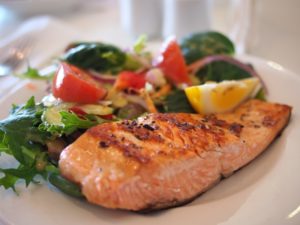There are so many different diets to choose from. And if you are in your perimenopause, what is the best menopause diet to follow? Here I look at some important aspects that are sometimes missed when choosing the best menopause diet for you.
Types of Menopause Diet
1) The Intermittent Fasting Menopause Diet
There is a lot of good information that shows that fasting is potentially a useful way of losing weight and improving aspects of your general health. However, it is not suitable for everyone. I also have a reservation about following this approach if you are perimenopausal.
Effects of Low Blood Sugar on Menopausal Symptoms
When our blood sugar drops low enough we can release adrenalin. We also release a hormone called cortisol more slowly over time if our blood sugar dips sufficiently. Both of these are very powerful hormones.
 My experience of working with women who are trying to find the right menopause diet for them is that very often, following a menopause diet plan that involves intermittent fasting can make their menopausal symptoms worse. The adrenalin released revs up hot flushes and night sweats. This and the impact on our general health means it may be better to follow a menopause diet that stabilises your blood sugar levels rather than creating a rollercoaster ride.
My experience of working with women who are trying to find the right menopause diet for them is that very often, following a menopause diet plan that involves intermittent fasting can make their menopausal symptoms worse. The adrenalin released revs up hot flushes and night sweats. This and the impact on our general health means it may be better to follow a menopause diet that stabilises your blood sugar levels rather than creating a rollercoaster ride.
Who Should Not Follow a Fasting Diet Plan?
If you have diabetes you need to take medical advice as fasting may present issues. Even if you do not have diabetes but you are someone who also has a sensitive blood sugar system, and low blood sugar levels leave you feeling shaky, etc. then I would avoid this approach. In this case following a diet plan that allows you to improve your blood sugar stability may be better.
There are other instances when fasting is not generally advised, or should only be undertaken under medical advice. These include pregnancy and breast-feeding, children, the very elderly, anyone who is currently unwell, or has a serious or long-term health condition, and those taking medication where fasting could be an issue. If in doubt seek advice.
2) The Keto Diet for Menopause
 The Keto diet plan involves reducing your carbohydrate intake to a minimum. Only 5-10% of your calories are to come from carbs. With 20-25% coming from protein and 70-75% from fat. Without carbs to burn for fuel, your body will gain its energy from fat instead.
The Keto diet plan involves reducing your carbohydrate intake to a minimum. Only 5-10% of your calories are to come from carbs. With 20-25% coming from protein and 70-75% from fat. Without carbs to burn for fuel, your body will gain its energy from fat instead.
When you are body is burning fat for fuel you are in a state called ketosis. There are some positive aspects to this. But I do have some concerns about possible longer-term issues in some instances. As Dr Mercola recommends in his article Everything You Need to Know About the Ketogenic Diet, once your system is used to this way of eating follow a cyclical approach.
Keto diet key points:
- Make sure you focus on the healthy fats for your increased fat intake.
- Eat a plentiful amount of fresh vegetables, salad and fruit as works in the plan for you.
- Drink plenty of water.
- Minimise or avoid alcohol and caffeine.
- If you are vegetarian carefully research how to implement this approach. Eating enough protein can be more of a challenge. The Essential Vegetarian Keto Cookbook has some background information and recipes.
3) The Mediterranean Diet for Menopause
 This is probably a diet you already know about as its health benefits have been acknowledged for many years. Eating a varied diet with a good emphasis on fresh vegetables, salad and fruit. With healthy fats, seafood, and mostly white meat. And avoiding refined and processed foods. It creates a broad range of foods to choose from and enjoy. You can read more about the Mediterranean Diet if you would like to know more about its benefits.
This is probably a diet you already know about as its health benefits have been acknowledged for many years. Eating a varied diet with a good emphasis on fresh vegetables, salad and fruit. With healthy fats, seafood, and mostly white meat. And avoiding refined and processed foods. It creates a broad range of foods to choose from and enjoy. You can read more about the Mediterranean Diet if you would like to know more about its benefits.
You may also find The 8-Week Blood Sugar Diet Recipe Book to be of interest. A low-carb version of the Mediterranean diet that can help stabilise blood sugar and support a healthy weight.
Adapting this approach for menopause means looking at reducing or eliminating alcohol and caffeine. These can make hot flushes, night sweats and other menopausal symptoms worse.
Finding the Best Menopause Diet Plan for You
We are all different. A diet that suits one person may not suit another. I also believe we may need to explore different ways of eating at menopause as our needs and metabolisms change. During our perimenopausal years I would place emphasis on finding a healthy diet that stabilises blood sugar levels. One that allows you to feel strong and nourished.
 There are universal themes that run through many dietary approaches. Eating a good variety of fresh food and avoiding processed and refined foods. You can read about foods that help with menopause to create a plan tailored to you at this point in your life.
There are universal themes that run through many dietary approaches. Eating a good variety of fresh food and avoiding processed and refined foods. You can read about foods that help with menopause to create a plan tailored to you at this point in your life.
Pay attention to other areas of your life too. Nourishment comes from many sources. Sleep, exercise, relaxation, fun and creativity all have a part to play. If in doubt, especially if you are planning major dietary changes, seek advice. And trust the truth of your own experience. Listen to your body and how you feel. Eat to nourish yourself and if you do not feel well on a particular diet plan, review and adjust to create the right menopause diet for you.
I hope you found this post on a Menopause Diet to be helpful. You can find other blogs about Menopause which may also be of interest. If you are curious about menopause coaching or therapies, in clinic in West or East Sussex, or via Skype, you can book an initial free mini-consultation to see if my approach might suit you, please do contact me.

